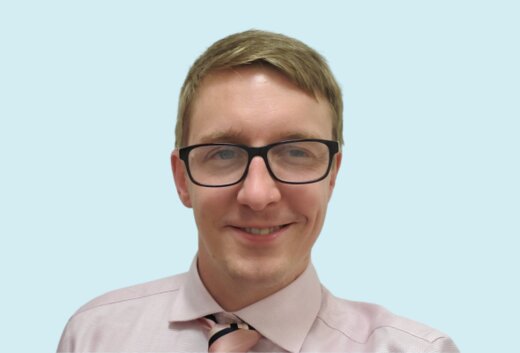21 June 2023
The Consultant haematologist and haemato-pathologist shares an exciting training opportunity and talks about his passion for education.
What is your role within King’s Health Partners?
I’m a haematologist, and the biggest part of my role is testing for and diagnosing blood cancers in the laboratory (South East Haematological Malignancy Diagnostic Service - SE-HMDS). I look down the microscope at blood, bone marrow and other samples, and interpret and integrate other information from our laboratories. I try to give all the diagnostic information treating clinicians across south east London, Kent and Sussex require to provide the best care for all those patients. I also treat patients with blood cancers in the clinic and on the ward, with a particular focus on chronic myeloid leukaemia. I have a large educational role in the department at Denmark Hill too.
As part of these roles, I’ve helped develop the KHP Haematological Malignancy Diagnostic Service (HMDS) integrated diagnostics course. This educational programme is aimed at haematologists and histopathologists (trainees and consultants alike), as well as senior clinical scientists. We aim to replicate the diagnostic intrigue of the HMDS using carefully chosen case studies, and short informative lectures. Our course is unique, in that it utilises new technology to digitise microscope slides, allowing all delegated to see the same images at the same time, from the comfort of a computer room.
What do you enjoy most about your role?
As a haematologist, I love that I can move seamlessly between my roles as a pathologist and a clinician. In no other specialty can you see the patient, perform and review their complex diagnostic cancer tests, and then go on to definitively treat the patient. Haematology is also at the forefront of research in diagnostics and treatment, and it’s exciting being able to translate this to the patients in front of me.
I also thoroughly enjoy sharing my experiences and knowledge with peers and the next generation, and I’m lucky to be so involved in education. Being able to use new digital technology in education is amazing in itself, but also allows the team to be right at the sharp end of its integration into routine patient care, which has the potential to revolutionise the role of pathologists.
What inspired you to get into this work?
Always thinking back to the patients! If I can make small changes to how things work, it could have the potential to make big impacts for the patients. Accurate diagnosis is key to great treatment, and I like to get things right!
What are the benefits of working in partnership?
I work with a plethora of other professionals, both in the clinical and laboratory settings, and would be nowhere without my great colleagues. Partnership and communication are always key to providing outstanding care, that’s why we are all here. You need help from others to get anything done, and there’s no way I could deliver the course solo. The team of doctors, scientists and support staff are all essential to the delivery.
What would be your one career top tip?
Be nice! You can be the smartest person in the room, with all the qualifications in the world, but if people don’t like working with you, you’ll struggle to get the role you want, or get done what you want to do. Work is also so much more fun when you get on with your colleagues, and good camaraderie can lessen the burden of the long hours we put in!
Sign up to the Haematalogical Diagnostic Service (HMDS) Course, Friday 7 July 2023





